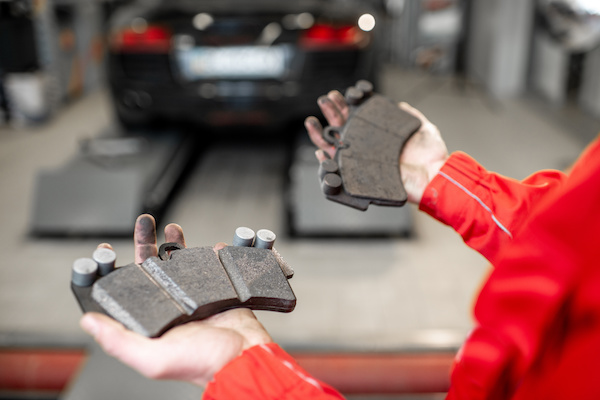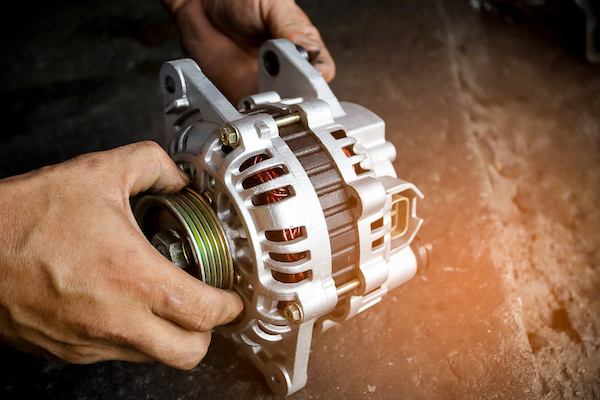Posted on 9/28/2022

A vehicle's brakes are among its most essential components. You must inspect the effectiveness of your brakes to ensure your safety and the safety of others on the road. On average, brake pads require replacement every 50,000 miles. Some will need to be replaced after 25,000 miles, while others may endure for 70,000 miles. Factors affecting the brake pad's durability Driving habits: Brake pads' lifespan is significantly influenced by how hard a driver presses the brake pedal. Environment: Driving in the city puts more strain on the brakes than driving in the country or on long, straight highways since there are more stop-and-go traffic and traffic lights. Brake pad hardness: Vehicle brake pads come in various compositions to meet multiple driving requirements. Most high-performance cars have hard compound brake pads, which are more durable but take longer to warm up before they work properly. Materials: Brake durability depends on the rotor and pad materials. Carbon-ce ... read more
Posted on 8/29/2022
.jpeg)
With back-to-school season upon us, it is more important now than ever to keep you and your loved ones safe on the road. The roads will be busy in the following months, and you need to be prepared for any situation that may arise unexpectedly. Whether you hit traffic, your car is broken down, or your child is not feeling well, come stocked with the right items. Here is a full list of essential emergency items to store in your vehicle: Flashlight Batteries For Flashlight Reflective Triangle Road Flares Heavy-Duty Jumper Cables Jump Starter - Portable Power Bank Duct Tape Tire Pressure Gauge Air Compressor Bungee Cords or Rope Multi-tool Spare Tire Lugged Wrench and Jack Heavy-Duty Gloves Rain Ponchos Cable Ties First Aid Kit to include OTC medicine, ointment, bandages, gauze, etc. Blanket Non-Perishable Snacks Water Bottles Furthermore, we want to give an honorable mention to extra bottles of vehicle fluids. If you don’t regularly check under the ho ... read more
Posted on 7/27/2022
.jpeg)
Pulling your vehicle out of the driveway is cool until you notice an unusual wet, dark spot on the ground where you had parked it. You decide to have a close-up view and realize it is a puddle of some car fluid. While it is perfectly normal to see some vehicle fluids, others can indicate trouble. Luckily, you can differentiate different types of vehicle fluids just by their colors. Here are some types of vehicle fluid leaks you should know; Oil Leak If you notice a black puddle or a small black stain, your vehicle is likely leaking oil. Initially, the oil is amber-colored but gradually turns black over time while lubricating the engine. An oil leak will likely occur at various gaskets and the oil pan. Coolant Leak A coolant or antifreeze leak is often noticeable by a bright orange, pink, or green puddle. And since coolants are highly toxic, you don't want your children, pets, and animals near coolant leaks. While coolant leaks were regular some years back, modern cars don ... read more
Posted on 6/27/2022
.jpeg)
Have you noticed loud screeching or squealing sounds coming from under the hood of your car or truck recently? This can be a sign of impending serpentine belt failure. Your serpentine belt is one of the most important components of your car's engine. What is a Serpentine Belt? This "S-shaped" belt is part of a network of pulleys in your engine. Serpentine belts work with internal pulley systems to power internal engine components for alternators and air conditioning compressors. They also send power to water pumps and power steering pumps that cool and steer your vehicle. If you hear screeching or squealing noises coming from the front of your vehicle, this is a sign of potential trouble under the hood. Your serpentine belt or other critical engine components cause this. Keep reading to learn how to recognize the signs of impending serpentine belt failure. Signs Your Serpentine Belt is Failing Is your serpentine belt failing? Most belts show specific signs before the ... read more
Posted on 5/26/2022

Having trouble with your car not starting or turning off shortly after you start driving? If your car isn't starting or is sluggish upon startup, this can show potential mechanical problems caused by a dead battery or a failing alternator. Keep reading to learn the difference between the two. Battery Issues Your car battery is the primary power source for many of your vehicle's mechanical functions. The car battery is also responsible for starting your car. If your car doesn't start or power on at all, this is the most obvious sign of a battery-related issue. In most cases, your battery will show a deterioration in performance or not starting if you've passed the replacement date noted on the battery. Other indicators of potential battery issues include your car not starting at all, starting slowly, or the visual appearance of corrosion on the battery itself. Alternator Issues The alternator powers and charges your car battery as you drive. Alternator issues can loo ... read more